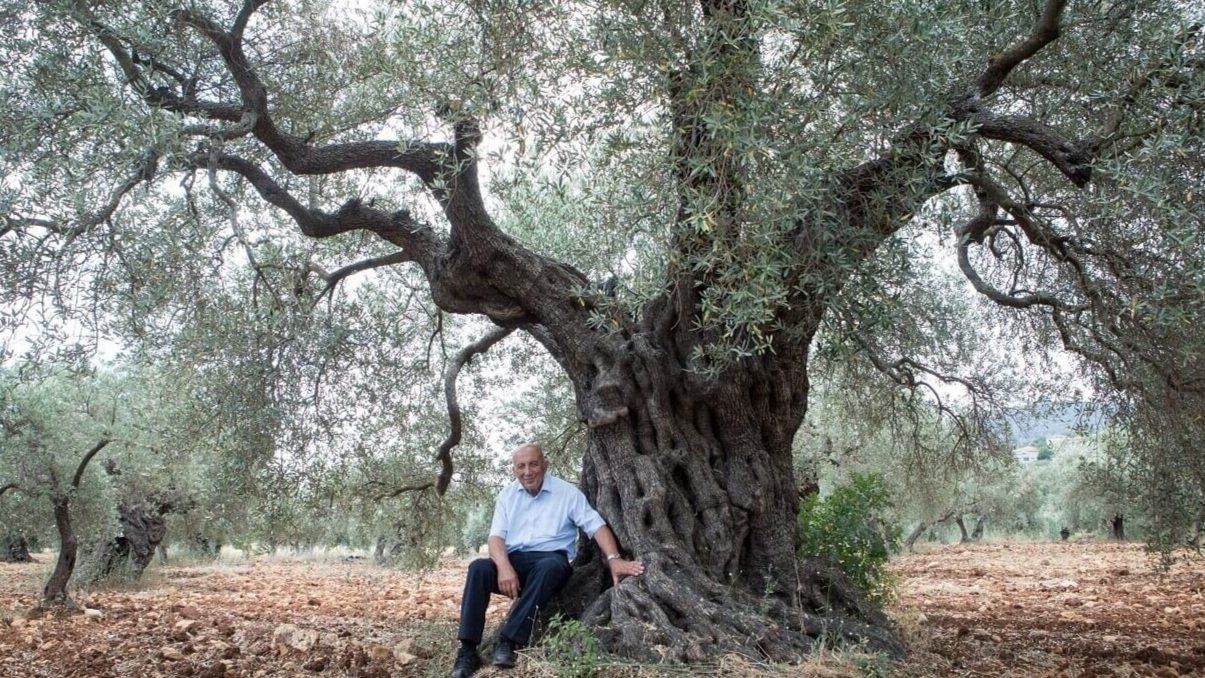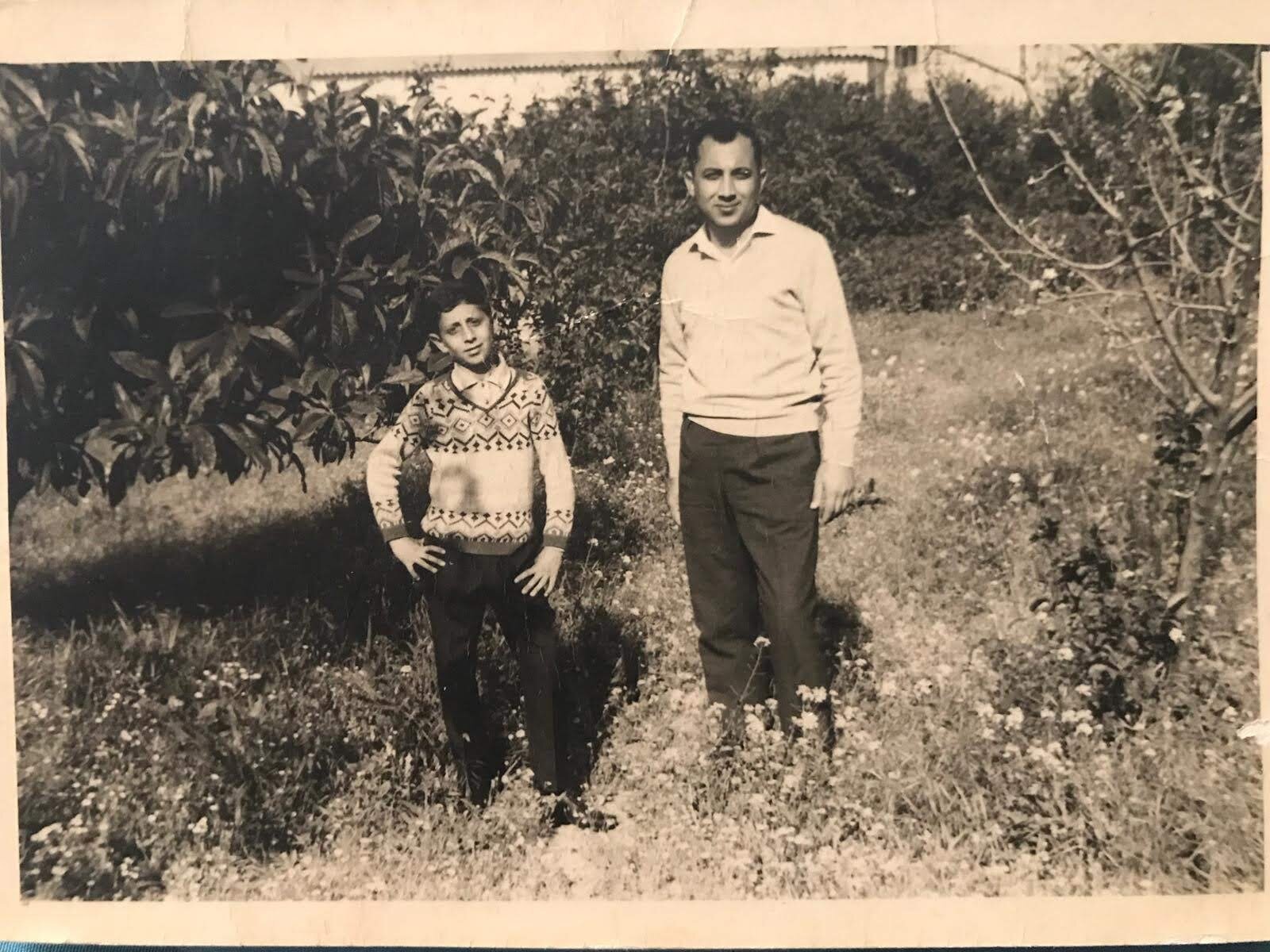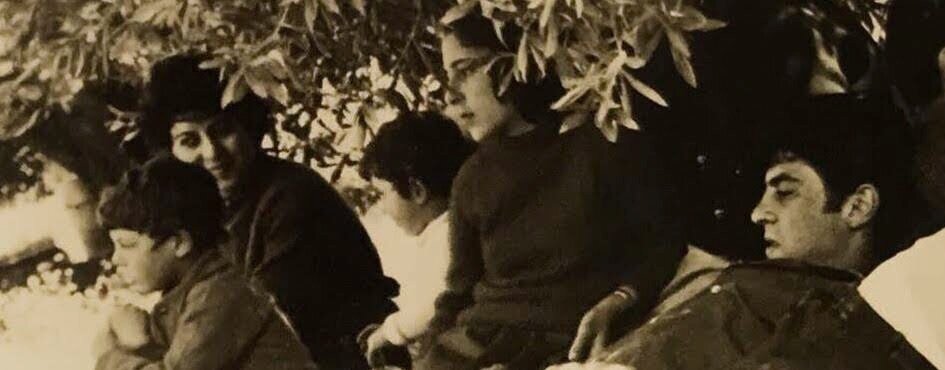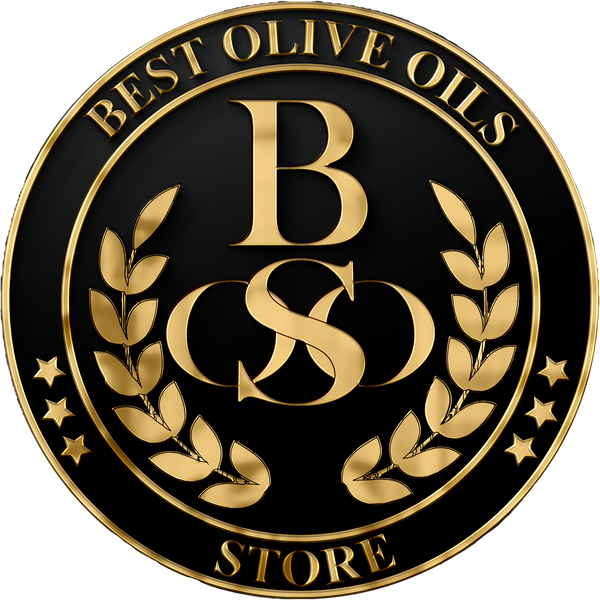
Khalaf Olives

2022 Khalaf Extra Virgin Olive Oil
The Khalaf Olives Family Estate
Well-Rooted Olive Oil, Since 1862
Khalaf Family Estate is a small extra virgin olive oil producer located in Rameh in the Galilee Mountains, the ancient birthplace of olive oil.
As featured in the NYT, Rameh has long been famed for growing the richest, most spectacular olives “The Queen of Palestinian olive oil”, providing an even more unique and exquisite taste that cannot be found anywhere else in the world.
Our ancient groves are still tended with sustainable methods that have been in use for centuries, picked at peak ripeness, not green, not black, but shades and spots of green and purple-black. The olives are pressed immediately after harvest. It gives the olive a bitter-sweet taste. That’s how we like our olive oil.
We grow our olives without any artificial irrigation, fertilizers or chemicals. The trees were never watered by men, they are rainfed. In Arabic, we call it Ba’al - pure and natural as nature itself. It makes a rather small yield, but tradition is not about having more, but doing what your elders did.

Deep History and Even Deeper Olive Oil Flavor
Dedicated to growing and milling the finest quality olive oil
The Khalaf Olives estate is located in the pristine Palestinian village of Rameh in the Galilee mountains, a hidden beauty of northern Israel.
This area has been an important location for olive oil production, due to its optimal climate and topography. A privileged area where nature has created a rare combination of sunshine and stony ground, the ideal environment for the mythical olive tree to thrive in.
In Rameh, people continue to take pride in their olive oil’s reputation, which extends throughout the Levant, it’s mentioned in the Old Testament, in newspaper articles, books and even poems, the olives are described as “the best you ever laid eyes on,” and the village itself as “the queen of Palestinian oil”.
Today the Khalaf Olives estate follows this tradition as a family run olive and olive oil estate. We produce only premium olive oil using traditional methods combined with modern technology.
Being a boutique olive oil producer, we grow, harvest and press solely our own olives and do not mix different varieties from other regions. Hence, we can define our product as “Pure Terroir” or “single estate olive oil”, which has a distinctive flavor and exquisiteness on the palate.
Family History Timeline

1850’s
Khalaf Khalaf arrived from Lebanon to Rameh, where he married Helwi, they had 4 kids, Khalil was the youngest born in 1872.

1902
Khalil immigrated to the USA, running away from duty service at the Othman army and seeking a better future.

1924
After spending more than 20 years, starting at coal mining to having his own business in NY state, he still didn’t feel at home, and decided to come back to Rameh with all the money he had saved.

1926
Khalil and his brother inherited 25 acres (100 Dunams) olive land, Khalil also bought additional 12 acres (50 Dunams).

1927
Khalil married Hanneh Khalaf, and they built the first stone house in the village of Rameh, where the family still lives to this day, and made a living from the olive orchards. Khalil and Hanneh had 6 kids.

1944
Khalil Khalaf died, leaving behind Hanneh and six kids, Khalaf the eldest was 15 years old – when his main will for his kids was to keep harvesting and taking good care of the olives.

1990
Khalaf and Musa were eager to keep their father’s will, they purchased more olive lands, found an old olive press and decided to buy it for the family’s personal use.

2015
Description goes here

Today
Today the family owns 50 acres (200 Dunams) of ancient Souri olive trees.

About Our Olives
The olive is one of the three basic crops that are often mentioned together in the Old Testament and enumerated therein: grain, wine and oil. The Romans called the olive “the queen of trees”, the beauty of ancient olive trees, regal and powerful , typifies the scenery in the Galilee.

Few miles from the Sea of Galilee, in the village of Rameh (الرامه - er-Rameh ), at 550m altitude reaching 50 Acres (200 Dunams) wide lays a pasture of +1000yr old olive trees. For centuries, Rameh has been famed for growing the richest, most spectacular olives, often referred to as “The Queen of Palestinian olive oil”, providing an even more unique and exquisite taste that cannot be found anywhere else in the world.
The fruit of the olive was a food, and the oil expressed from it was an essential part of human existence. That oil was used for food, in cooking, for illumination, in the preparation of cosmetics for anointing the body, and in the practice of medicine. With this oil, kings and priests were anointed.

For the past 160 years, the olive orchard has been cultivated by the Khalaf’s, a Palestinian Christian family that has deep roots in Rameh and takes great care in growing, cultivating and producing the most exquisite 100% beyond organic olive oil.
The fruit of the olive was a food, and the oil expressed from it was an essential part of human existence. That oil was used for food, in cooking, for illumination, in the preparation of cosmetics for anointing the body, and in the practice of medicine. With this oil, kings and priests were anointed.

The moving of “Jesus trees” as referred to for years by the villagers
Our olives are harvested by November and early December, waiting for the olives to start blackening, this gives the oil a sweeter taste that’s divine.
The fruit which remains on the tree or falls off the sheets are left for the poor to come and collect them. “When thou beatest thine olive tree, thou shalt not go over the boughs again: it shall be for the stranger, for the fatherless and for the widow.”
The olives are grown without any artificial irrigation or fertilizers. The trees were never treated with chemicals, never watered! even the 2000+ years old ones. We call this Baal – pure organic as nature produces it. Ba’al is the name of the Canaanite god of fertility, weather, rain, wind, lightning and seasons.
All the olives are of the variety Souri coming from the city of Sour, or Tyre. Tyre was known for its great olives since ancient times. The legend says that an Olive tree of the goddess Ashtart rose there, protected by a curtain of Flames






Through the ages, olive oil has become synonymous with Palestinian cuisine, particularly in the Galilee where the hillside village of Rameh is located.
The picture of an olive tree or olive grove spells Galilee as much as a Mediterranean Sea sunset, or a mosque or a chapel on top of a mountain village.
Olive oil is an integral part of almost all popular Palestinian dishes, from Arabic vegetable salad, Tabooleh, Hummus to Manaqeesh and from Musakhan, Muhammar to Kibbeh Nayeh.
Hundreds of studies have explored olive oil’s health benefits over the last six decades, ever since Ancel Keys initiated his famous Seven Countries Study in the 1950s, and found out that Mediterranean populations tend to live longer and suffer less from heart disease, high blood pressure and strokes than North Americans and northern Europeans.

TodayWhat is Khalaf Olive Oil?
Khalaf olive oil is an extra virgin olive oil produced from ancient olive trees of the Souri variety growing in Rameh Valley.
Ar-Rameh (Rameh) Valley has been home to olive trees for several millennia and its oil has been dubbed liquid green gold. Khalaf’s olive grove is located on the eastern part of the valley, where the rich soil produces a bold, pungent olive oil that has been famous throughout the eastern Mediterranean for many centuries.
Khalaf olive oil is an extra virgin olive oil produced from ancient olive trees of the Souri variety growing in Rameh Valley.
Rameh retains its title as Palestines's premium olive oil hotspot for many centuries, a bulletin published by The U.S. Department of Agriculture in 1910 mentions that Rameh “holds the record for the productivity and quality of its olives. There is here a fair degree of uniformity in the character of fruit, and the best methods of cultivation in the country are here in use.”

Why does the location of the grove have an influence on the flavor?
This has to do with the natural characteristics of the location. Characteristics like the soil, how much sun, how much rain and the temperatures in the region.
The Mediterranean climate; warm and dry summers is something characteristic for Rameh.

Approximately 8 hours of sun a day, which is quite a lot, makes sure the fruits have the ability to ripe. This gives a soft and fruity flavor to the olive. In the fall it is important that the olive trees get enough rain. The rain makes sure the olives can swell. In Rameh, rain falls 78 days a year. This is exactly the right amount to let the olives swell just before the harvest. It means beautiful olives are ready at the moment of picking. This is often at the end of November.
What are the techniques in growing, harvesting and milling Khalaf Olive Oil?
Khalaf olives are grown without any artificial irrigation or fertilizers. The trees were never treated with chemicals, never watered! even the 2000+ years old ones.
We call this Baal – pure organic as nature produces it. Ba’al is the name of the Canaanite god of fertility, weather, rain, wind, lightning and seasons.
The olives are harvested within a tight and specific timeframe, not being allowed to ripen on the trees any longer than absolutely necessary. The oil is then extracted immediately after harvesting and not permitted to be left lying. When olives are just ripe, the olives have enough oil and are at the ideal stage for easy harvest and extraction.
Our olives are harvested only by November and early December, waiting for the olives to be at optimum ripeness and start blackening.
Our extra virgin olive oil is made from the finest olives picked from our grove in Rameh valley
Khalaf olives are always handpicked, blown and washed. Picking the olives by hand means no damage and enables us to select only the best olives. This is absolutely essential for the quality of the oil!

What olive variety is used for Khalaf olive oil?
The authentic type of the olive has a high influence on the flavor.
All the olives are of the variety Souri coming from the city of Sour (Tyre) located 20mi northwest of Rameh. Tyre has been known for its olive oil for more than 3,000 years.
The legend says that “Originally the island was not attached to the sea floor, but rose and fell with the waves. An Olive tree of the goddess Ashtart rose there, protected by a curtain of Flames. A snake was wrapped around its trunk and an eagle was perched in it”.
Our premium extra virgin olive oils are crafted from Souri olives, hand-picked from our trees, crushed and cold pressed the same day to ensure the freshest possible oil arrives in each bottle.
Extraction, bottling and storage are carried out in full compliance with good hygiene practices to guarantee our customers impeccable olive oil quality.
So, what does Khalaf Olive Oil taste like?
Our natural olive oil, with an unmistakable aroma and flavor, is made from carefully selected fruit of the Souri variety from Rameh, known for centuries as the queen of Palestinian olive oil.
Our olive oil has a delicate and persistent aroma and a medium fruity flavor.
In an article in NewYork Times our oil was described as follows: “Fresh out of the press, it is bright liquid gold, its aroma reminiscent of the wild grasses and dandelion leaves that grow around the olive trees. People describe it as ripe and smooth, almost like samneh (ghee, or clarified butter)”
Rameh and Olive Groves throughout History
Rameh was known for its olive groves throughout its history, in 1881 the PEF's Survey of Western Palestine (SWP) described Rameh as "a village, built of stone, of good materials, containing a Greek chapel; it is situated in plains, with large olive-groves, gardens and vineyards; five perennial springs near the village, and several cisterns in it."
Moreover, Olive oil production can be traced back to thousands of years ago, right around the Sea of Galilee area where Rameh is located. The domestication and exploitation of fruit trees was the key step in creating Mediterranean polyculture, especially the triad of wheat, olive and vines. This process began at the eastern end of the Mediterranean around 5000 BCE but was not completed at its western end until the late 1st millennium BCE. The evidence is consistent in pointing to a place - the Jordan valley - and a time – the Copper Age (or Chalcolithic) – for the first beginnings of olive cultivation.
This is indicated by an increasing number of olive stones found at archeological sites and a sharp rise in the proportion of olive pollen in lake sediment cores taken at locations from Golan to the Dead Sea. The area around the Sea of Galilee must thus have been located at the heart of the world’s oldest olive oil production. In the millennia since then, evidence shows cyclical peaks and troughs in olive production in this region, with large-scale commercial production and trade during Roman times, but subsequently returning to olive cultivation for local production and consumption. Although olive production was important in places such as Crete almost as early as in Palestine, the biggest commercial olive producers today (southern Spain and southeastern Italy) only took this dominant role in recent centuries.
THE KHALAF ESTATE

When the olives are perfectly ripe, they’re hand-picked and cold-pressed in our mill to create a wonderfully delicous oil. Our olive oil is also distinguished by its vibrant green color. We’re proud that Khalaf’s Extra Virgin Olive Oil “Pure Terroir” has been recognized and enjoyed as one of the best olive oils in the country for over 160 years.

At the heart of Rameh village and in the Galillee, in the north lies the Kalaf olive estate, a sprawling family-owned estate, flourishing with olive trees and producing its extra virgin olive oil, with lots of family love.
khalafolives.com



